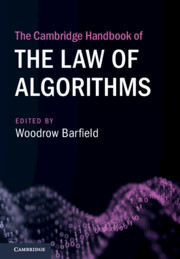Book contents
- The Cambridge Handbook of the Law of Algorithms
- The Cambridge Handbook of the Law of Algorithms
- Copyright page
- Contents
- Figures
- Tables
- Notes on Contributors
- Foreword
- Preface
- Acknowledgements
- Abbreviations
- Part I Introduction and Setting the Stage for a Law of Algorithms
- Part II Business, Regulations, and Decision-Making with Algorithms
- Part III Intellectual Property and Algorithms
- Part IV Criminal Law, Tort Issues, and Algorithms
- 19 The Use of Algorithms in Criminal Adjudication
- 20 Assessing the Risk of Offending through Algorithms
- 21 Injury by Algorithms
- 22 When Do Algorithmic Tortfeasors that Caused Damage Warrant Unique Legal Treatment?
- 23 Tort Law
- Part V Constitutional Law, Human Rights, and Algorithms
- Part VI Applications and Future Directions of Law and Algorithms
- Index
23 - Tort Law
Applying A “Reasonableness” Standard to Algorithms
from Part IV - Criminal Law, Tort Issues, and Algorithms
Published online by Cambridge University Press: 19 October 2020
- The Cambridge Handbook of the Law of Algorithms
- The Cambridge Handbook of the Law of Algorithms
- Copyright page
- Contents
- Figures
- Tables
- Notes on Contributors
- Foreword
- Preface
- Acknowledgements
- Abbreviations
- Part I Introduction and Setting the Stage for a Law of Algorithms
- Part II Business, Regulations, and Decision-Making with Algorithms
- Part III Intellectual Property and Algorithms
- Part IV Criminal Law, Tort Issues, and Algorithms
- 19 The Use of Algorithms in Criminal Adjudication
- 20 Assessing the Risk of Offending through Algorithms
- 21 Injury by Algorithms
- 22 When Do Algorithmic Tortfeasors that Caused Damage Warrant Unique Legal Treatment?
- 23 Tort Law
- Part V Constitutional Law, Human Rights, and Algorithms
- Part VI Applications and Future Directions of Law and Algorithms
- Index
Summary
As technology continues to advance and specifically as algorithms proliferate into society, the law is increasingly confronted with the task of determining who is responsible when property is damaged or people are harmed. From a historical perspective, the Industrial Revolution resulted in machines that were able to automate tasks that were previously performed manually by humans. However, despite the superiority of these early automated machines, their use could cause physical damage; due to, for example, machine malfunctioning, poor machine design, or misuse by their users. The legal framework traditionally applied to machine-induced damages is comprised of two doctrines: that of general negligence and that of product liability. In this chapter, with algorithmic-based entities, I focus primarily on the reasonable person standard for actors.
Keywords
- Type
- Chapter
- Information
- The Cambridge Handbook of the Law of Algorithms , pp. 493 - 514Publisher: Cambridge University PressPrint publication year: 2020



